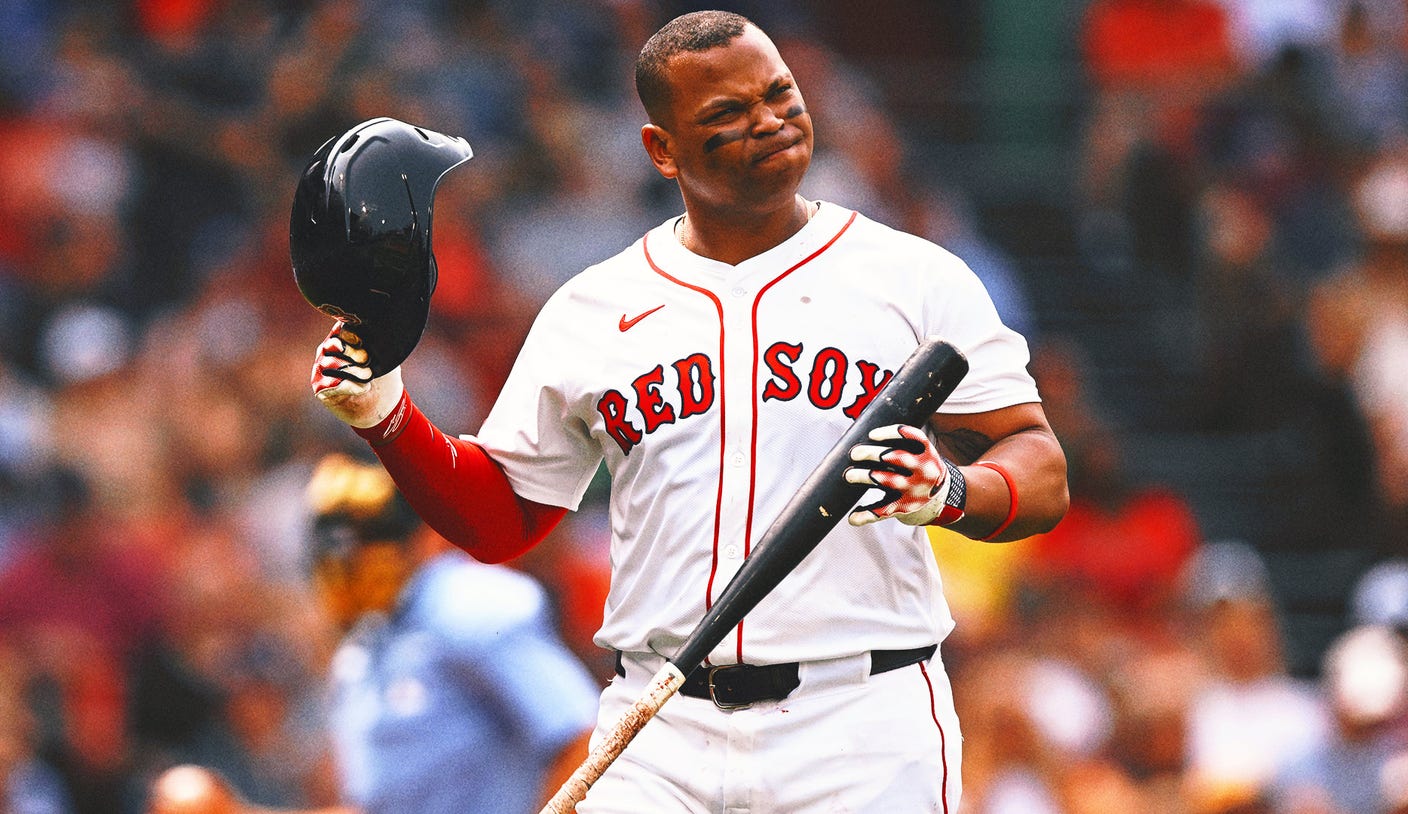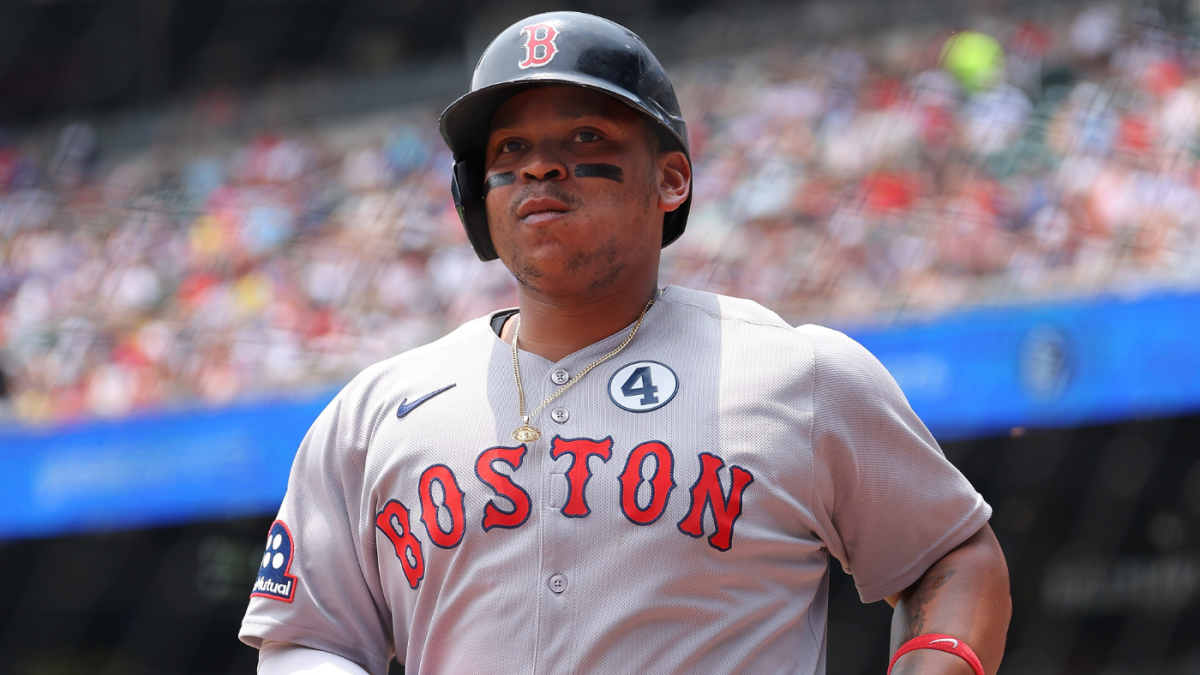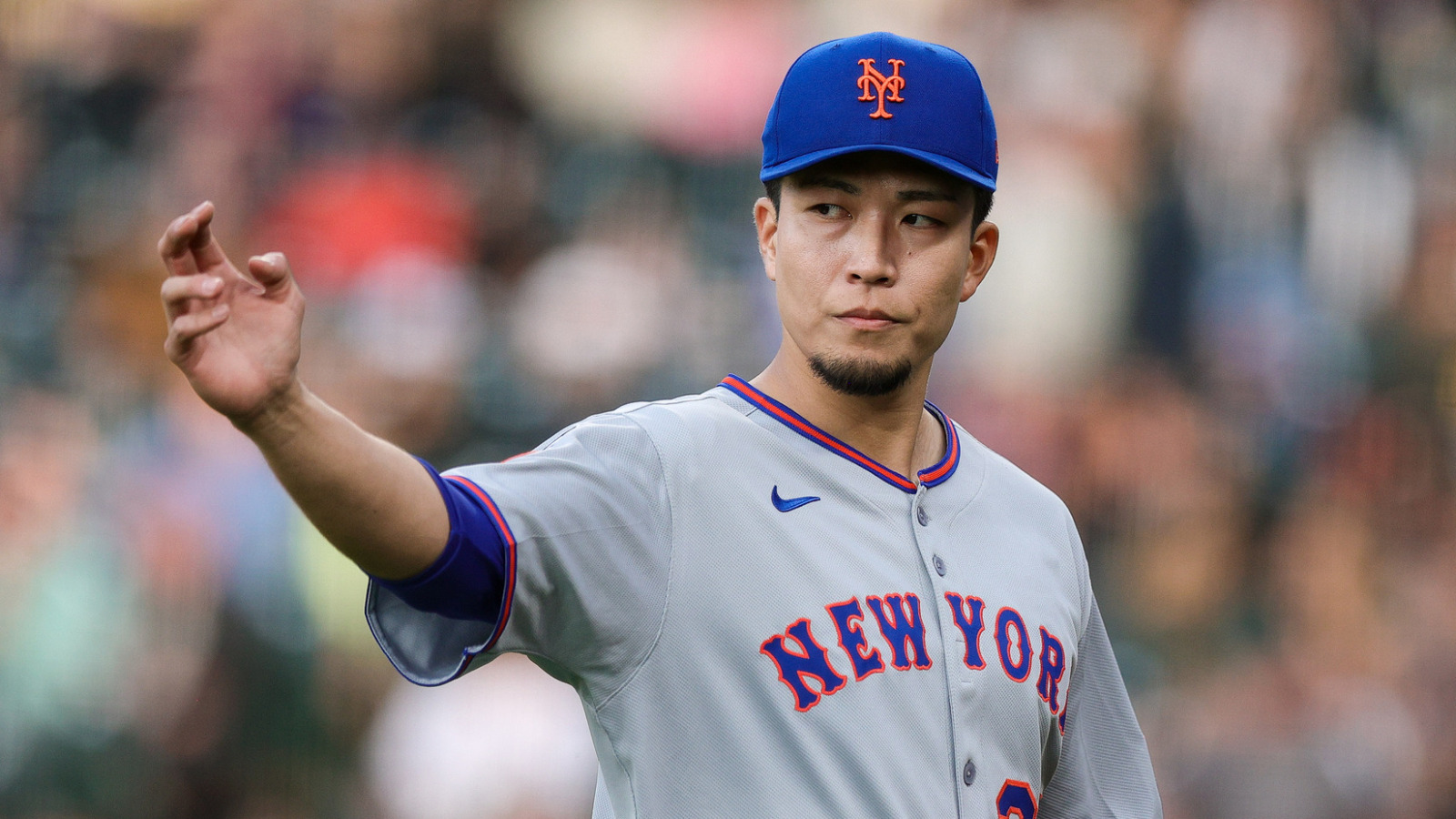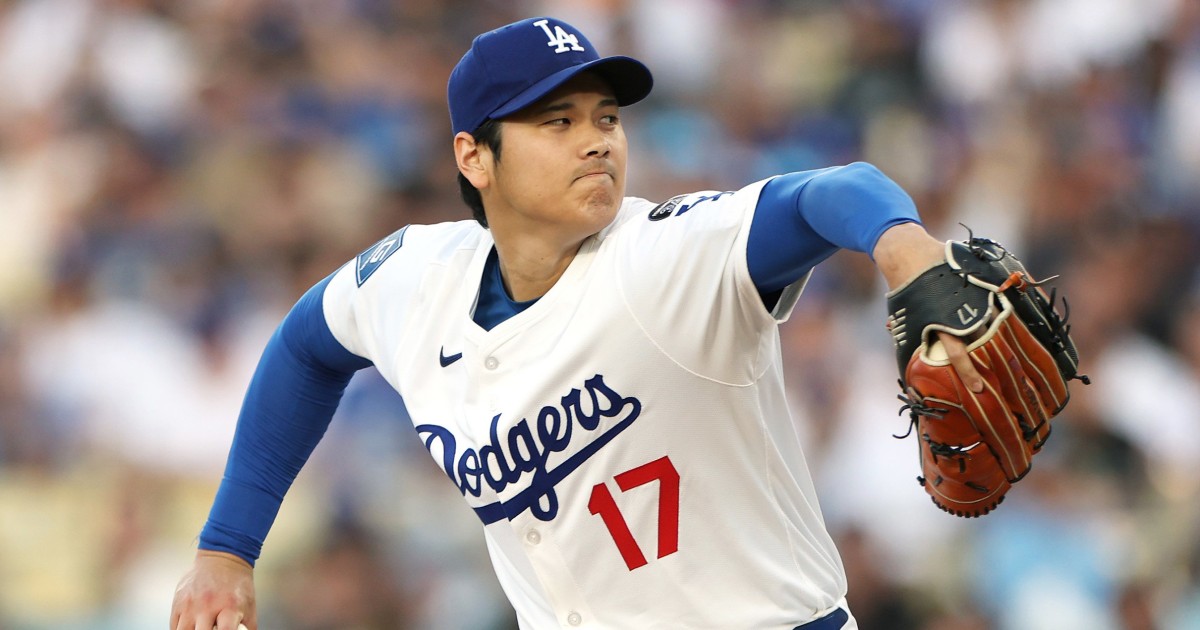Even in the earliest days of the season, it seemed like we were in store for a messy breakup in Boston.
“They put me in this situation,” Rafael Devers said back in May. “They told me they didn’t want me to play any other positions.”
The situation Devers referred to was the Boston Red Sox asking him to go from playing third base to DH to first base, something the three-time All-Star never seemed comfortable doing. He didn’t mince words when he was asked about the ongoing friction, saying it was “inappropriate” for the Red Sox to keep asking him to switch positions.
“Now, they should do their jobs essentially and hit the market and look for another player. I’m not sure why they want me to be an in-between,” Devers said then.
Throughout the first part of the season, Devers and the Red Sox tried to make it work. But it was a struggle. It showed in the ugly, public back-and-forth. It showed in his body language, when he would cross his arms in the dugout, fail to run out ground balls, and engage in tense interactions with manager Alex Cora.
But this avoidable saga didn’t begin this season. It’s the culmination of the team’s mismanagement of a homegrown star player, leading to a frayed relationship before the end of what was supposed to be a decade-long marriage between the two sides.
Sounding familiar? That’s because we’ve now seen this happen twice before in the last five seasons — with Mookie Betts and Xander Bogaerts.
And it’s all led to what will go down as the most shocking trade in Major League Baseball this season, with Devers getting sent to the San Francisco Giants on Sunday.
“We had a different vision for him going forward than he had, and we couldn’t get there,” Red Sox president and CEO Sam Kennedy said Monday. “We couldn’t find alignment. And we reached that inflection point and made the decision to make a big move.”
ADVERTISEMENT

Rafael Devar’s time in Boston came to a close on Sunday with a trade to the San Francisco Giants. (Photo by Jaiden Tripi/Getty Images)
The Devers saga begins with Boston’s cost-cutting decision to trade Betts to the Los Angeles Dodgers in February 2020. There was, unsurprisingly, fierce backlash to the Sox parting ways with Betts, the 2018 American League MVP and one of the best players in the history of the organization. The Betts trade was a salary dump, designed so that Red Sox owner John Henry could save money and dip below MLB’s luxury tax threshold.
The ire encompassing the Red Sox fan base was further provoked after the organization did not re-sign Bogaerts in December 2022. That time, the Sox didn’t even bother trading the shortstop in order to get something in return. They simply let Bogaerts, another homegrown star and a key member of their 2018 championship team, walk away in free agency after making unserious, low-ball offers that were never going to keep him in Boston.
In January 2023, after repeatedly letting down the fan base, Henry and then-chief baseball officer Chaim Bloom responded to the growing turmoil by signing Devers to a 10-year, $313.5 million contract extension. In a vacuum, the Red Sox found an anchor in Devers, a star player the team could win with and build around. Finally, right? Except, there were always questions about the timing of the Devers signing, the largest deal in the franchise’s history, which was littered with red flags from the start.
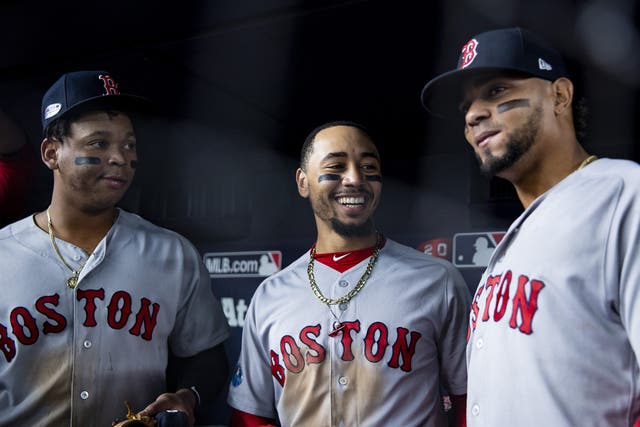
Three key players of the last Red Sox team to win the World Series – Xander Bogaerts, Mookie Betts, and Rafael Devers – are now gone. (Photo by Billie Weiss/Boston Red Sox/Getty Images)
The front office’s decision to sign Devers long-term seemed like it happened in large part because the Sox didn’t have a choice. They needed to get in the good graces of their fan base and signal in some way that they were still committed to winning. After the financially-motivated decision to part ways with Betts and Bogaerts, they couldn’t let a third homegrown star depart from Boston and expect the Fenway Faithful to support them. So the Devers deal was viewed as an expensive reaction to losing clubhouse leaders and fan-favorite players.
While it was a no-brainer for Devers to agree to the deal, there were always concerns that the contract would age poorly.
Devers was a 26-year-old All-Star with defensive limitations at the time of the signing. It was as clear then as it is now that Devers would eventually be expected to transition from third base to first base or serve as the designated hitter. But, in 2023, the Red Sox felt that those conversations could be postponed. What mattered most two years ago was that Devers would be the clear face of the franchise and the club’s offensive catalyst through his age-36 season. He would be the one to save face from the front office’s cost-cutting mistakes.
But the Red Sox didn’t think this through.
The thing is, the team’s decision to shelve important conversations about their expectations of Devers was, ultimately, at the heart of the failure that led to his trade. If the Red Sox felt that part of the responsibility of signing a $300 million-plus contract was being a team leader, then that had to be communicated to Devers before finalizing the deal. There was a clear void in clubhouse leadership after Betts and Bogaerts left Boston, but in 2023 Devers told reporters that he doesn’t see himself as a leader. Still, on a Red Sox roster brimming with new, young players, Devers would clearly be pushed into that role whether he felt comfortable with it or not, which is a surefire way to create underlying tension.
Then came the Alex Bregman signing. Under chief baseball officer Craig Breslow’s leadership, the Red Sox this winter signed Bregman to play third base, but they were unclear about their expectations for Devers. Remember that conversation about Devers eventually being forced to move off third, something that should’ve taken place at the time of his signing? It was botched. Devers told reporters in spring training that he didn’t know what the Red Sox had planned for him, or where he was expected to play long-term. After all, Bregman has an opt-out after this year, so it’s possible the Red Sox could need a third baseman again by next season.
Their internal communications were just as messy as all the public back-and-forth drama.
By the end of spring, Devers agreed to move to designated hitter. After starting the season 0-for-19 with 15 strikeouts, he finally found a groove in his new role, emerging as a top 10 hitter in baseball since May. Then came the season-ending injury to first baseman Triston Casas. Again, the Red Sox asked Devers to switch positions and play first base. Devers refused, stating the team told him earlier in the year to put away his glove. Again, the Red Sox failed by not clearly communicating to Devers their expectations of him, even while knowing that they were thin at first base behind Casas.
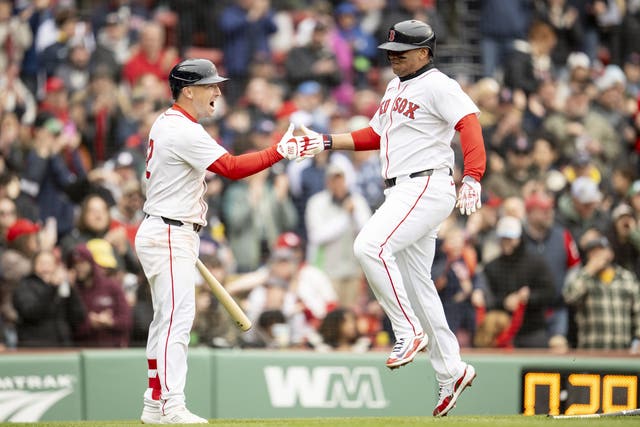
Alex Bregman’s arrival did little to clarify Rafael Devers’ future with the Red Sox. (Photo by Maddie Malhotra/Boston Red Sox/Getty Images)
Then came a Sunday evening that fans will never forget. The Red Sox swept their rival New York Yankees on Father’s Day, bringing them just a half-game back in the American League wild-card race. Devers did his thing, as usual, punishing the Bronx Bombers with a clutch home run. Finally, the Red Sox looked like a playoff team and fans were optimistic for the first time in several years. The front office shattered that momentum before dinner. A few hours after Devers celebrated a big win and asserted that he was confident about the club’s chances, the Red Sox traded him to San Francisco.
“This is not the outcome that we had expected, and it’s forced me to reflect on the interactions that I’ve had, not just with Raffy, but with other players, and opportunities to communicate differently. … I need to own things that I could have done better,” Breslow said Monday.
The Red Sox asserted that there was a chasm between Devers and the front office that was irreparable, but did they honestly try? Even as the team finally started playing better, even as Devers himself said he was past all the distractions, the Red Sox could not look beyond that boiling tension. Since the Giants have agreed to take on his contract, the opportunity to dump Devers’ salary while moving on from a player whose biggest crime was speaking his mind was too delicious for the Red Sox to pass up — even if it now means they’re an objectively weaker team with a much more arduous path to the playoffs because of it.
Now, in the middle of June, there are more questions about the team’s future than there are answers.
Most importantly, how will the Red Sox spend the money they saved on Devers’ contract, valued at around $255 million over the next eight seasons? And even if the relationship was irreparable, why trade Devers now? Bregman is all but certain to opt-out at the end of the year, and the Red Sox no longer have any leverage in those negotiations, so his agent, Scott Boras, can raise the price knowing Boston is desperate to roster a third baseman. And what happens the rest of this season? The Red Sox offense was designed to rely on Devers as the anchor to a slew of up-and-coming players who will undoubtedly suffer pitfalls during their major-league development. Without Devers and Bregman out with injury, the lineup is not strong enough to overcome those growing pains.
“This is no way signifying a waving of the white flag on 2025. We’re as committed as we were six months ago to putting a winning team on the field to competing for the division and making a deep postseason run,” Breslow said. “Being great teammates and sacrificing and stepping up for each other and embodying this shared vision, we believe that those are principles that we need to be faithful to.
“At the end of the season, we could look back and say that we’ve won more games than we otherwise would have because of the way that this roster is now able to come together.”
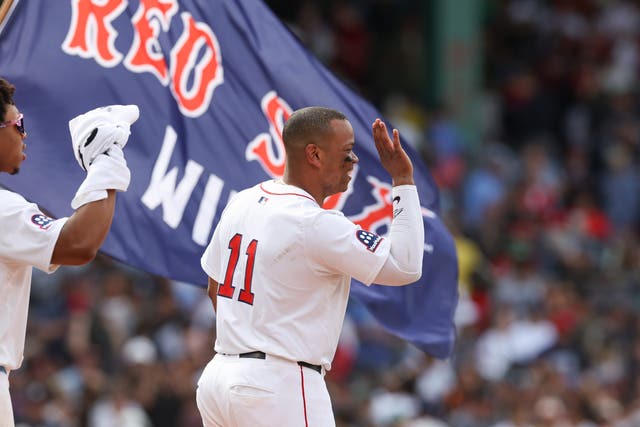
Rafael Devers’ final appearance for Boston saw him hit a home run against the Yankees. (Photo by Paul Rutherford/MLB Photos via Getty Images)
Devers, an annual 30-home-run hitter, is not easy to replace, even despite his defensive limitations. The four players Boston received in exchange for the trade don’t even come close to justifying the talent the team just lost. So this was yet another salary dump from Henry, who is right back where he was after he traded Betts — on the wrong end of the deal. How did the Red Sox justify their latest misstep to fans?
Rather than face the music, Henry would rather hide. The club owner has not held a formal media availability since 2020, and he’s not going to start now. Breslow and Kennedy, too, were in no rush to hold a press conference on a devastating trade for the fan base. They waited more than 24 hours since Devers was told he was traded to the Giants to divulge their thought process, which was shared over a Zoom-video call late Monday night. How brave.
The Red Sox are putting on a masterclass on how not to treat star players. In case it isn’t clear, they’ve botched it every step of the way.
Deesha Thosar covers Major League Baseball as a reporter and columnist for FOX Sports. She previously covered the Mets as a beat reporter for the New York Daily News. The daughter of Indian immigrants, Deesha grew up on Long Island and now lives in Queens. Follow her on Twitter at @DeeshaThosar.
recommended

Get more from Major League Baseball Follow your favorites to get information about games, news and more
